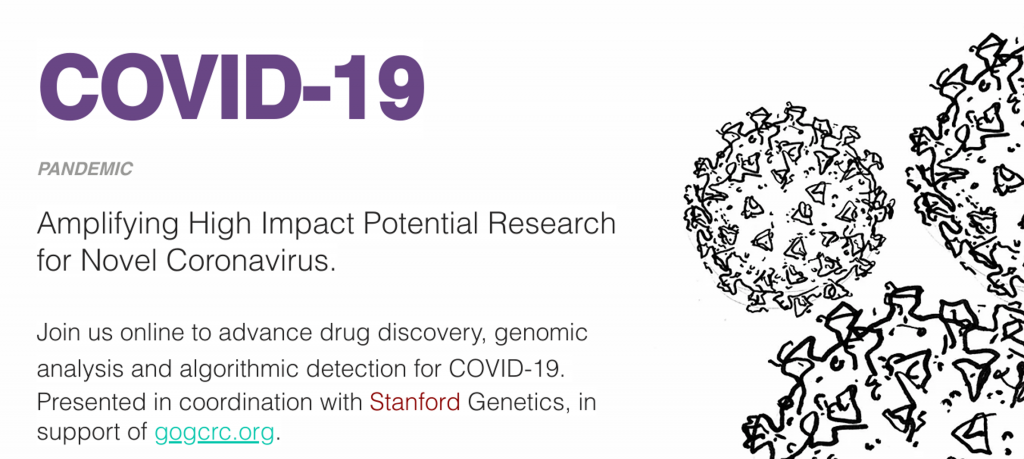
Sequestered in bedrooms, kitchens, and makeshift office spaces around the world, a virtual army of bioinformatic enthusiasts has banded together to do their bit in the battle against coronavirus.
These data doyens are working behind the scenes to build the tools and infrastructure scientists need to better understand and respond to the virus that is currently ravaging the world. They are helping to overcome current obstacles to research, and they are coming up with brand new solutions to a number of challenges related to drug discovery, development, and delivery.
They are gathering online for “hackathons,” which are essentially grassroots, sprint-like design events in which groups of experts (usually in small teams) compete or collaborate intensively over a number of days to solve technical challenges.
Dozens of hackathons devoted to COVID-19 are being launched worldwide, involving thousands of scientists, including many from DNAnexus.
Principal scientist Ben Busby is helping to coordinate several of the events, a role he is familiar with after helping to organize more than 40 hackathons in his former job as genomics outreach coordinator at NCBI.
Hackathons are great ways to generate new ideas, foster intense learning and facilitate data sharing and collaboration among people who would never have met otherwise, he said.
“And the DNAnexus Platform is a great data integration and collaboration solution, especially since it already has security built in,” Busby said.
COVID-19 Biohackathon
April 5-11, 2020

Hundreds of scientists and bioinformaticians have already signed up for this week-long event, organized by an international team of established biohackers.
Using video conferencing, e-mail, Slack messaging, wikis, and source code repositories, teams will work together to address more than 20 topics.
Among them is a project to create a coronavirus “pangenome.” This would involve collecting genomic data for SARS-CoV-2 and the five other types of coronavirus known to infect humans (SARS-CoV, HKU1, NL63, OC43 and 229E), and coming up with data comparison and visualization programs in order to help researchers answer questions like: What virulence factors do SARS and CoV have in common? What proteins influence virulence, and are we likely to see a new strain emerge that is even more virulent?
hackseqRNA: COVID-19 Ultra-hackathon
April 4, May 2, May 22-24

In this peer-led hackathon, participants are encouraged to propose projects and organizers will help recruit a team of interdisciplinary RNA biologists, bioinformaticians, statisticians, computer scientists, and developers to turn the idea into a reality.
The hackathon entails one-day coding ‘sprints’ to develop hackseqRNA projects and lay the ground-work for research efforts, followed by a final three-day push to bring each project to completion.
Among the projects to be tackled: Using RNA sequencing data to better understand how coronaviruses react with the immune system, how different drugs work within the system, and whether personalized treatments might be developed based on individual patients’ responses.
Amplifying High Impact Potential Research for Novel Coronavirus
April 4-5

Organized by the non-profit group Research to the People and Stanford University, this hackathon involves several initiatives, from tapping into wearable devices like FitBit and Apple Watch to track infectious diseases and predict the onset of symptoms, to using computational models to simulate the effectiveness of potential coronavirus therapies.
Busby will be leading a team exploring novel genomics research directions for COVID-19, including the potential for using HLA typing to determine a person’s (or population’s) predisposition to COVID-19 severity. A kind of genetic test used to identify certain variations in a person’s immune system, HLA (short for human leukocyte antigen) typing is currently used to identify which people can safely donate bone marrow, cord blood, or an organ to a person who needs a transplant.
Busby’s team will investigate any correlations between HLA types and an individual’s susceptibility to coronavirus, as well as the severity of their reactions when infected. They may also look at potential epidemiological ramifications based on geographic distributions of HLA types. This research will help to lay the groundwork for the HLA COVID-19 Project.
Seeding New Science
Although the projects may not result in complete, polished solutions, they will help seed new science, which can be just as valuable, Busby said.
“This could be a really good opportunity to think about precision medicine in infectious diseases, something that’s been largely ignored before now,” he added. “Treatments would be way more effective if you knew your immune type. It could also help in the assessment of personal susceptibility and risk.”
Busby also notes that even if the current COVID-19 pandemic subsidies, the virus — or others like it — will likely re-emerge.
“Having responses ready when it does re-emerge would be very helpful, but we have to start now,” he said. “Our contribution to the ‘all hands on deck’ coronavirus call is to build an infrastructure so that we will be able to respond in a much better, far more constructive, way.”


